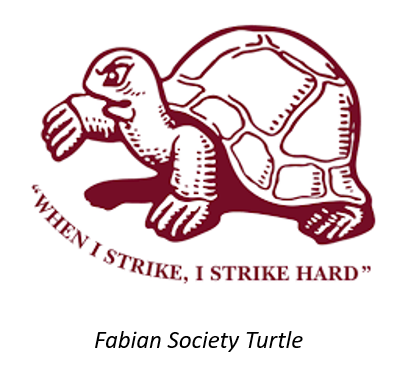Fabian Socialism: A Cousin of Marxist Communism
As a kind of creed, G. Bernard Shaw wrote the Fabian Society’s Manifesto which includes the tenet, “That the state should compete with private individuals—especially with parents—in providing happy homes for children, so that every child may have a refuge from the tyranny or neglect of its natural custodians.”130 Shaw, whose own childhood was unstable, was influenced by the ideas of Karl Marx (he socialized with Marx’s daughter).131 Marx’s Communist Manifesto called for “abolition of the family.”132 Similarly, Shaw’s Fabian Manifesto called for the “emancipating” of children, placing the authority of the state over the authority of parents.133
Shaw contributed many tracts to the Society including Fabian Tract No. 233 which advocates for socialism defined as,
- ... the complete discarding of the institution of private property by Transforming it into public property and the division of the resultant public income equally and indiscriminately among the entire population .... In Socialism, private property is anathema and equal distribution of income the first consideration. (p.3)134
In other words, Shaw advocated for the redistribution of private individuals’ wealth but rather than confiscate private property through large-scale political upheaval (revolution), Fabians execute small-scale actions linking reformism by government action with socialism (evolution).135
Founder Edward Pease described how the Fabian Society was influenced by Karl Marx’s writings as interpreted by John Stuart Mill.136 Fabians promote the gradual evolution of society through the shaping of politics, education, and the printed word (media).137 One of the Fabian Society’s logos representing their slow march through institutions is the Fabian turtle.138 Fabian deceptive tactics, such as creating new word meanings unknown to the general public when promoting socialist policies, are described as "intellectual guerrilla warfare" against free market societies.139
Fabian Socialism Moves to America and the NEA
 The Fabians did not introduce socialism to the United States. Rather, Scotsman Robert Owen introduced the first socialist experiment to the United States in 1825. His commune, New Harmony, Indiana, failed after two years, but Owen was convinced that the problem was not socialism but the fact that children were not primed to be socialists through education.
The Fabians did not introduce socialism to the United States. Rather, Scotsman Robert Owen introduced the first socialist experiment to the United States in 1825. His commune, New Harmony, Indiana, failed after two years, but Owen was convinced that the problem was not socialism but the fact that children were not primed to be socialists through education.
In 1895, Christian Socialist W.D.P. Bliss established the American Fabian Society and was editor of the American Fabian Magazine. American Fabians maintained the political doctrine of “progress” as:
- ... the indefinite improvability of mankind, but it was the social state, not the individual, who was thus improvable (emphasis added). It was “a living organism, a social state [collective] capable of indefinite improvement.” Moreover, it was held that the state must have the power to institute the socialist program. Nationalization, efficient planning, and the other concomitants of socialism were seen to require unquestioned authority [totalitarianism]. (p. 118)140
For Fabians, “equality of condition,” or equity, required “that the state, by “the first interference” with private lives, assure to all persons the same start in life, and also that the state measure achievement in terms of unequal individual competence.” (p. 118)141 The American Fabian Society endured less than a decade, but the demise of the Christian Socialist organization did not end the permeation of British Fabian Socialism into America.
Rather than establish a working model of a socialist community, a loosely organized group spearheaded by British Fabian socialists established a kind of colony for an American society of intellectuals on Turtle Bay in Manhattan.142 The intellectuals then infiltrated positions of influence in American organizations and universities.
On September 12, 1905 a group of prominent American intellectuals met together in lower Manhattan, including Harry Laidler, Upton Sinclair, Clarence Darrow, and Jack London.143 They established the Intercollegiate Socialist Society (ISS) to promote “an intelligent interest in Socialism among college men and women, graduate and undergraduate, through the formation of study clubs ....”144, 145 The ISS was not formally associated with but in the orbit of the Socialist Party and in close intellectual contact with the British Fabian Societies.146
By 1921, the organization’s name changed to the League for Industrial Democracy (LID), organized for the specific purpose of “education for a new social order based on production for use and not for profit.”147, 148 Industrial Democracy is the title of a book written by British Fabian Society founders Sidney and Beatrice Webb.149 The Fabian Society’s Forty-ninth Annual Report directly links the British Fabian Society and the American LID stating, “ ...we continue active association ... with the League for Industrial Democracy of New York which carries on active propaganda in the United States on very similar lines to our own work here ....” LID began to function as an educational arm of the broad Socialist Party milieu.150
In 1908, the ISS established permanent headquarters in the Rand School of Social Science. The Rand School was founded as the intellectual center of American socialism. Established in 1906, its governing body was the American Socialist Society (ASS). Board members of the ASS included Harry Laidler, who became LID’s executive director. The ASS directors closed the Rand School in 1956. Its library of socialist, communist, and organized labor literature is housed at New York University.151
How Schools Have Been Changed
The early history of British socialism suggests that socialism — with its unshakable faith in science, central planning and the cold rationality of the intellectual elite — contained the seeds of the atrocities associated with management of the world’s population through abortion, sterilization, chemical birth control, and restricted access to health care. Intellectual elites funded by business elites had only contempt for ordinary people, who were regarded as “sub-men” to be tended and looked after by the welfare state. In Anticipations, H.G. Wells described a shadow government headed by wealthy elites who find themselves running the world by using education to nudge the world’s population to accept their plan. Wells wrote,
- [The] New [World] Republic may begin visibly to shape itself out and appear. It will appear first, I believe, as a conscious organization of intelligent and quite possibly in some cases wealthy men, as a movement having distinct social and political aims, confessedly ignoring most of the existing apparatus of political control, or using it only as an incidental implement in the attainment of these aims. It will be very loosely organized in its earlier stages, a mere movement of a number of people in a certain direction, who will presently discover with a sort of surprise the common object towards which they are all moving.152
Wells described a different set of anticipations in his book The Open Conspiracy: Blueprints for a World Revolution153. He described his anticipation of resistance from patriots, especially American patriots, and his plan for how to eliminate their resistance:
 We are coming to see more and more plainly that certain established traditions which have made up the frame of human relationships for ages are not merely no longer as convenient as they were but are positively injurious and dangerous. And yet at present we do not know how to shake off these traditions, these habits of social behaviour which rule us. Still less are we able to state, and still less bring into operation, the new conceptions of conduct and obligation that must replace them.
We are coming to see more and more plainly that certain established traditions which have made up the frame of human relationships for ages are not merely no longer as convenient as they were but are positively injurious and dangerous. And yet at present we do not know how to shake off these traditions, these habits of social behaviour which rule us. Still less are we able to state, and still less bring into operation, the new conceptions of conduct and obligation that must replace them.- —and until recently that was a quite tolerable system of frame-works into which a general way of living could be fitted.... The young were trained to be loyal, law-regarding, patriotic, and a defined system of crimes and misdemeanours with properly associated pains, penalties, and repressions, kept the social body together. Everyone was taught a history glorifying his own state, and patriotism was chief among the Virtues....
- Socially and politically we want a revised system of ideas about conduct, a view of social and political life brought up to date.
- The fundamental organization of contemporary states is plainly still military, and that is exactly what a world organization cannot be. Flags, uniforms, national anthems, patriotism sedulously cultivated in church and school, the brag, blare, and bluster of our competing sovereignties, belong to the phase of development the Open Conspiracy will supersede. We have to get clear of that clutter.
- As new world controls develop, it becomes the supreme business of the Open Conspiracy to keep them worldwide and impartial, to save them by an incessant critical educational and propagandist activity from entanglement with the old traditional rivalries and feuds of states and nations.
- A majority of people in Europe, and a still larger majority in the United States and the other American Republics, could become citizens of the world without any serious hindrance to their present occupations, and with an incalculably vast increase of their present security.
- But there remains a net of special classes in every community, from kings to custom-house officers, far more deeply involved in patriotism because it is their trade and their source of honour, and prepared in consequence with an instinctive resistance to any reorientation of ideas towards a broader outlook. In the case of such people no mental sanitation is possible without dangerous and alarming changes in their way of living. For the majority of these patriots by metier, the Open Conspiracy unlocks the gates leading from a fussy paradise of eminence, respect, and privilege—and motions them towards an austere wilderness which does not present even the faintest promise of a congenial, distinguished life for them.
Phyllis Schlafly was among the special class of American patriots with an instinctive resistance to any reorientation to Wells’ socialist ideas and who Wells hoped to banish to “an austere wilderness.” As beneficiaries of her courage and fortitude, her legacy to us is to continue the resistance she modeled.
Conclusion
A close study of the slow and deliberate changes throughout the six editions of the NEA’s American Citizens Handbook and probe into the philosophical and ideological origins of those changes serve to explain how current issues in American K-12 education were planted and cultivated over the past century.
Footnotes:
Want to be notified of new
Education Reporter content?
Your information will NOT be sold or shared and will ONLY be used to notify you of new content.
Click Here
Return to Home Page
